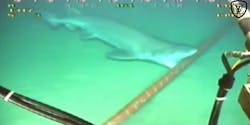Google hopes Kevlar cabling can avert sharks' fiber-optic Internet feast
As recently reported by Australia's The Daily Dot, "If you live in Southeast Asia and can't stream YouTube videos or access Facebook, sharks may be to blame...Whatever the explanation, there are undoubtedly issues with sharks attacking undersea Internet cables.
A surveillance camera attached to equipment reinforcing one of Google's cables captured video of one such attack in August.
RELATED STORY: Plans sink for major submarine fiber cable system
To prevent sharks from chomping through fragile and expensive fiber-optic wires, Google, which has pledged to collaborate on a similar $300 million undersea cable to Japan, has started wrapping its cables in Kevlar. It's a smart plan, but it offers little in the way of comfort to frustrated Southeast Asians battling slow load times and month-long service outages...."
Full story:Curious and confused sharks may be biting through Vietnam's Internet cables (dailydot.com)
